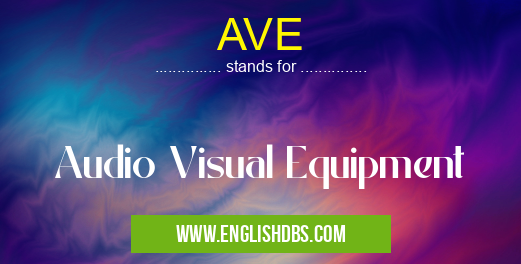What does AVE mean in UNCLASSIFIED
AVE is an acronym that stands for Audio Visual Equipment. It refers to the electronic devices and equipment used to capture, process, and display audio and video content. AVE plays a crucial role in various applications, including education, entertainment, and communication.

AVE meaning in Unclassified in Miscellaneous
AVE mostly used in an acronym Unclassified in Category Miscellaneous that means Audio Visual Equipment
Shorthand: AVE,
Full Form: Audio Visual Equipment
For more information of "Audio Visual Equipment", see the section below.
What is AVE?
AVE comprises a wide range of equipment, such as:
- Cameras: Capture video footage
- Microphones: Capture audio
- Projectors: Display video content
- Screens: Provide a surface for video projection
- Speakers: Output audio
- Mixing consoles: Control and process audio and video signals
- Video editing software: Manipulate and edit video content
Uses of AVE
AVE finds applications in numerous settings, including:
- Education: Enhancing lectures, presentations, and demonstrations
- Entertainment: Providing immersive experiences in cinemas, theaters, and live events
- Communication: Facilitating video conferencing, webinars, and remote collaboration
- Corporate events: Delivering presentations, demonstrations, and training programs
- Healthcare: Supporting medical procedures, patient education, and telemedicine
Benefits of AVE
AVE offers several advantages:
- Improved engagement: Captures audience attention and enhances understanding
- Increased productivity: Streamlines communication, facilitates collaboration, and saves time
- Enhanced accessibility: Makes content available to a wider audience
- Cost-effectiveness: Can reduce the need for travel and other expenses
- Versatile: Can be used in various settings and for diverse purposes
Essential Questions and Answers on Audio Visual Equipment in "MISCELLANEOUS»UNFILED"
What is AVE used for?
AVE, or Audio Visual Equipment, is a broad term that encompasses a wide range of electronic devices used to present and enhance multimedia content. This includes equipment such as projectors, screens, sound systems, video conferencing equipment, and interactive whiteboards. These devices are commonly used in educational, corporate, and entertainment settings to facilitate effective communication and collaboration.
What are the different types of AVE equipment?
AVE equipment can be classified into several categories based on its function and purpose. Some common types include:
- Projectors: Devices that project images or videos onto a screen or surface.
- Screens: Whiteboards, canvas, or other surfaces used to display projected images.
- Sound systems: Amplifiers, speakers, and microphones used to enhance audio quality.
- Video conferencing equipment: Cameras, microphones, and software that allow for real-time communication and collaboration over distance.
- Interactive whiteboards: Touch-sensitive screens that enable users to interact with digital content, write or draw on the screen, and share it with others.
What are the benefits of using AVE in presentations?
Incorporating AVE into presentations can offer several advantages, including:
- Enhanced audience engagement: Visual and audio elements can make presentations more captivating and memorable.
- Improved understanding: Visual aids can help clarify complex concepts and ideas.
- Increased collaboration: Interactive whiteboards and video conferencing tools facilitate active participation and collaboration among attendees.
- Professionalism and credibility: Using high-quality AVE equipment conveys a sense of professionalism and credibility to the presentation.
How do I choose the right AVE equipment for my needs?
Selecting the appropriate AVE equipment depends on several factors, such as the size of the audience, the type of content being presented, and the available budget. Consider the following guidelines:
- Determine the purpose and audience: Identify the specific goals of your presentation and the size and characteristics of your audience.
- Assess the available space: Measure the space where the equipment will be used to ensure it can accommodate the necessary devices.
- Consider the budget: Set a realistic budget and explore options that fit your financial constraints.
- Seek professional advice: Consult with an audio-visual specialist or vendor to get recommendations based on your specific requirements.
How do I maintain and troubleshoot AVE equipment?
Proper maintenance and troubleshooting are crucial to ensure the longevity and optimal performance of AVE equipment. Follow these tips:
- Regular cleaning: Regularly clean devices, including lenses, screens, and surfaces, to prevent dust buildup and ensure clear images.
- Proper storage: Store equipment in a clean, dry environment when not in use.
- Troubleshooting: If you encounter issues, check connections, power sources, and cables. Refer to the user manuals or seek professional assistance for more complex problems.
- Software updates: Regularly check for and install software updates to ensure compatibility and improve performance.
Final Words: AVE is an essential tool for capturing, processing, and displaying audio and video content. Its widespread use in education, entertainment, communication, and other fields demonstrates its versatility and the value it adds to various activities. By leveraging AVE, organizations and individuals can enhance engagement, increase productivity, improve accessibility, and achieve greater success in their endeavors.
AVE also stands for: |
|
| All stands for AVE |
